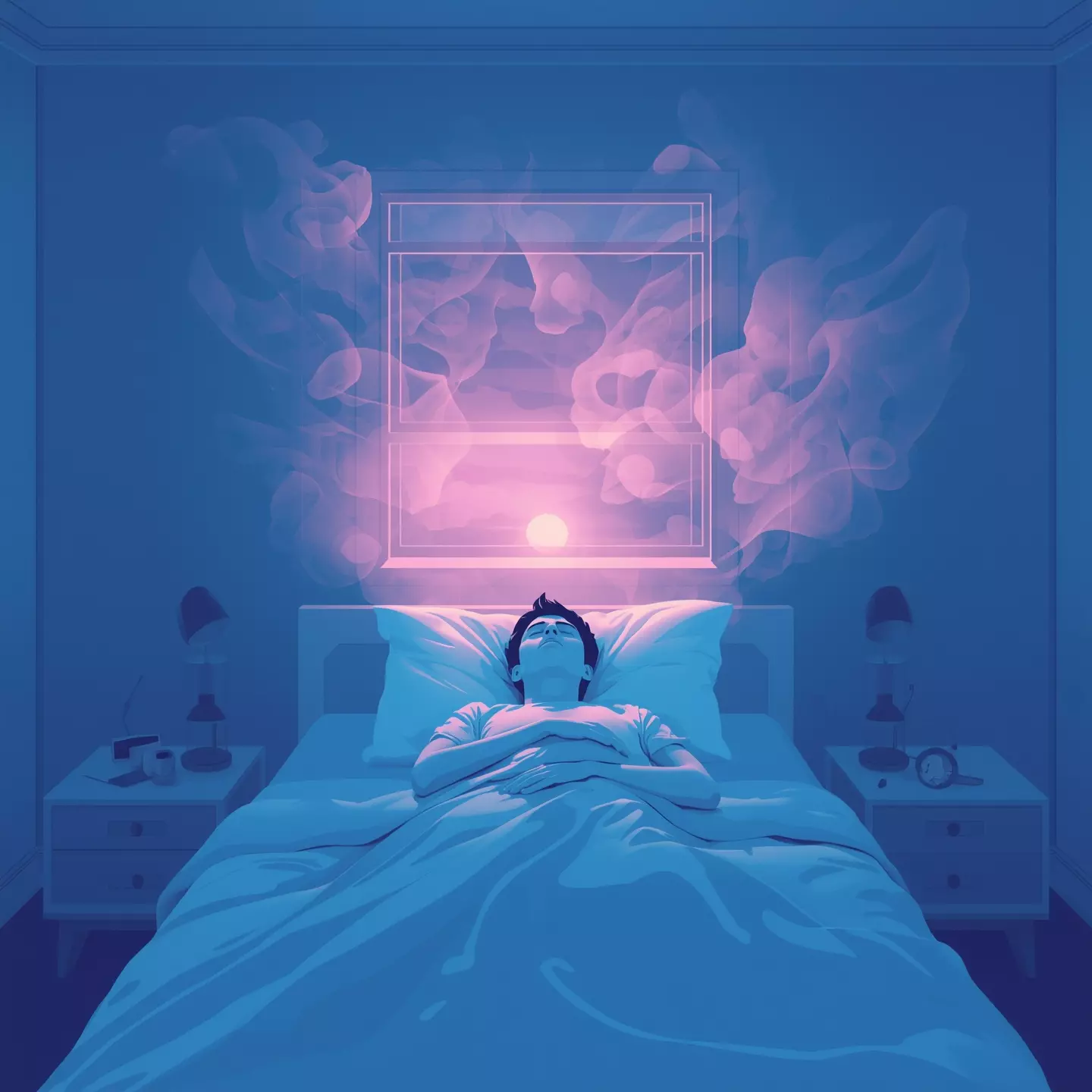Table of Contents
It’s late, and the house is quiet. Too quiet. You lie in bed, eyes closed, body heavy with exhaustion, but your mind refuses to join you. Instead, it’s a restless film reel, replaying the breakup scene on repeat—what was said, what wasn’t, the thousand alternate versions of how it could have gone differently.
You want to rest, but your brain insists on staying awake, as if solving heartbreak were just another math problem to work through at 2 a.m. If you’re wondering how to sleep after a breakup, you’re not alone.
Sleeplessness is one of heartbreak’s cruelest side effects. But it’s not a sign of weakness—it’s your brain’s way of coping with loss.
Why Can’t I Sleep After a Breakup, Even When I’m Exhausted?

Your body longs for rest, but your brain feels hijacked. Breakups trigger stress responses much like physical trauma. They send your nervous system into high alert, flooding you with intrusive thoughts and emotional “replays” of the relationship.
Psychologists call this rumination, and research shows it’s one of the strongest predictors of poor sleep after emotional upheaval.
The racing mind isn’t something you can just “switch off.” It’s not a failure of discipline or strength. It’s your brain’s misguided attempt to protect you—keeping the story alive, scanning for lessons, as if clarity might heal the wound. But in the process, it steals the rest you desperately need.
How Does Overthinking at Night Actually Affect My Recovery?
One bad night of sleep leaves anyone irritable. But after a breakup, those restless nights do more than fray your nerves—they deepen the pain.
- Poor sleep impairs the brain’s ability to regulate emotions
- Heartbreak feels heavier the next day
- Small triggers (like their name on your phone or “your song” in a store) hit harder
The cruel loop looks like this: heartbreak makes it hard to sleep, and lack of sleep magnifies heartbreak. The cycle feeds itself, leaving you exhausted, raw, and less able to cope.
This is why protecting your rest isn’t a luxury right now—it’s survival. Each hour of decent sleep is like adding a brick to the foundation of your healing.

Coping with the First Month After a Breakup
Let’s examine coping with the first month after a breakup in: Shock, Panic & implosion, Managing Daily Overwhelm (Survival Mode), The No-Contact Gauntlet, Emotional Outbursts – Rage, Crying & “What Is Wrong With Me” Moments, Coping Alone vs Reaching Out and Your First Glimpse of Hope
Tap here to read more →How to Sleep After a Breakup: Calming Your Mind

Here’s the part that matters most: you don’t need to force sleep. You need to create the conditions where your brain can trust it’s safe to let go for a while. That starts with quieting rumination.
- Cognitive Distraction: Shift focus from the breakup spiral to something neutral. Picture naming random animals, or visualize walking through a familiar house, room by room.
- Breathwork: Inhale for four counts, exhale for six. This lowers the “fight-or-flight” response.
- Mindfulness Anchors: Notice the sheets, the sound of your breath, the rhythm of your heartbeat.
- Journaling: Write down spinning thoughts before bed—every worry, memory, or unanswered question. The page can carry them so your mind doesn’t have to.
Final Thoughts
Sleep won’t always come easily in the first month after a breakup. That’s okay. What matters is showing your body and mind gentleness in the dark hours, instead of frustration.
Each night you practice these small rituals, you’re teaching yourself how to rest inside the grief.
And slowly, night by night, the racing thoughts will loosen their grip. One day, you’ll notice the silence feels less like an enemy, and more like a balm.
FAQs
FAQ
Q1. Why is it so hard to sleep after a breakup?
After a breakup, the body goes into a stress response, flooding the mind with rumination and intrusive thoughts. This keeps the brain in ‘alert mode,’ making it harder to relax into sleep even when you feel exhausted.
Q2. How does lack of sleep affect emotional healing after a breakup?
Poor sleep disrupts the brain’s ability to regulate emotions, which makes heartbreak feel heavier the next day. It can increase irritability, lower resilience, and slow the healing process.
Q3. What are some proven ways to calm my mind before bed after a breakup?
Techniques like cognitive distraction, breathwork, mindfulness, and journaling help quiet racing thoughts. These practices reduce rumination and create conditions for better rest, even if sleep doesn’t come right away.
Q4. Can improving my sleep really help me move on faster?
Yes. Protecting your rest is a vital part of recovery. Quality sleep improves emotional regulation, reduces stress, and helps you rebuild energy—making it easier to cope with the challenges of moving forward after a breakup.
Scientific Sources
-
Li, Y. et al. (2019): Relationship Between Stressful Life Events and Sleep Quality
Key Finding: Stressful life events impair sleep quality directly and indirectly by increasing rumination.
Why Relevant: Breakups are highly stressful events, and this explains why intrusive thoughts disrupt sleep.
https://www.ncbi.nlm.nih.gov/pmc/articles/PMC6545794/ -
Takano et al. (2012): Rumination and reduced sleep quality in students
Key Finding: Higher levels of rumination predict lower sleep quality.
Why Relevant: Rumination, which often spikes after a breakup, is strongly tied to insomnia-like symptoms.
https://namibian-studies.com/index.php/JNS/article/download/2909/2034 -
Mancone, S. et al. (2025): Emotional and cognitive responses to romantic breakups in …
Key Finding: Rumination and maladaptive coping after breakups predicted poorer emotional and physical outcomes, including sleep.
Why Relevant: Directly connects breakup-induced overthinking with sleep disruption and slower recovery.
https://pmc.ncbi.nlm.nih.gov/articles/PMC11985774/
- How to Sleep After a Breakup: Powerful Ways to Calm Your Racing Mind

- The 1 Task a Day Rule: A Powerful Survival Strategy to Heal After a Breakup

- Why Cleaning After a Breakup Feels Like Powerful Grief-Proofing for Your Space

- The One Clean Surface Rule: A Powerful Way to Heal After a Breakup

- Surviving Work After a Breakup: Powerful Tips to Heal and Stay Strong

- The Healing Power of a Shower: Your Mental Reset After Heartbreak

- Why Brushing Your Teeth Feels Hard After a Breakup – And the Surprising Truth That Will Comfort You

- Breakup Morning Routine: Simple Steps to Heal and Move On

- The Breakup Survival Guide: Overcoming Loss of Appetite After Heartbreak


Leave a Reply